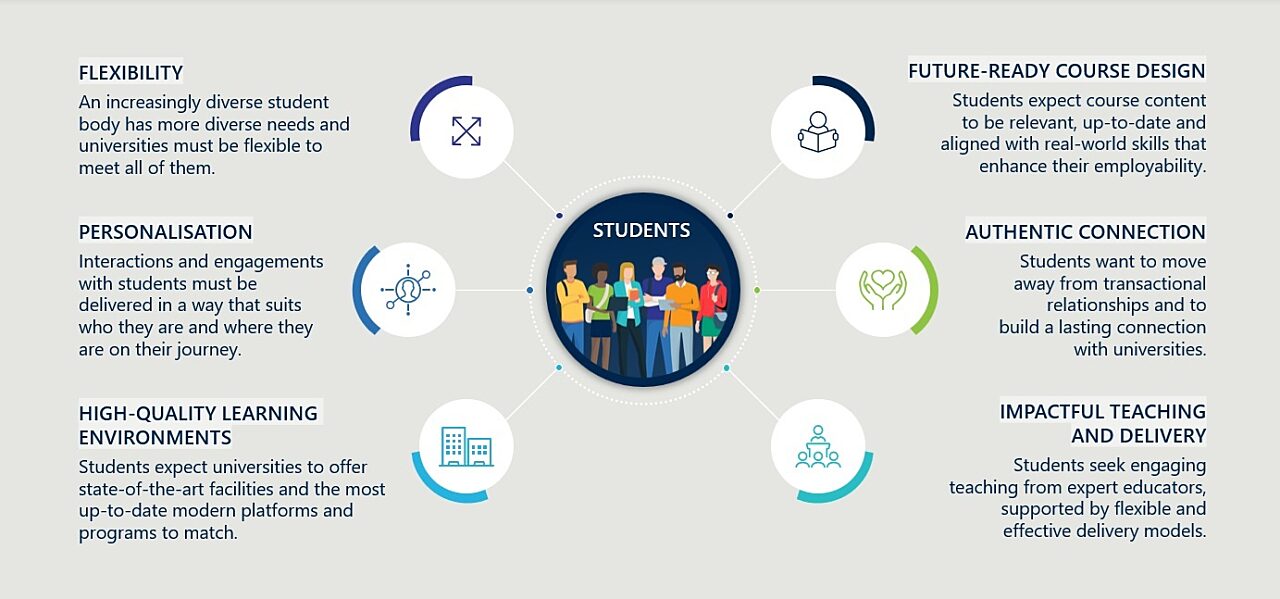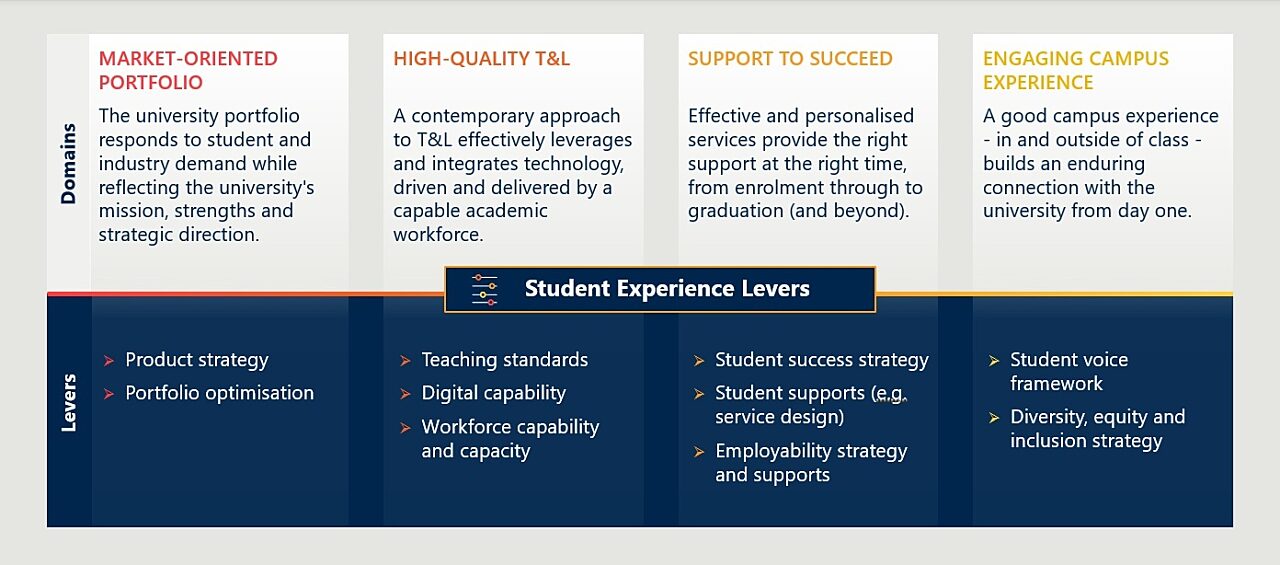Idea In Brief
Student retention is increasingly crucial
In a capped system, student retention is no longer optional, it’s a financial and reputational imperative.
A leading student experience provides competitive advantage
Universities that effectively meet and respond to student expectations will boost student satisfaction, success, and retention.
Universities must invest strategically
Improving student experience and outcomes means knowing your strengths, and your gaps, and where there is greatest opportunity to drive impactful change.
The launch of ATEC and impending Accord implementation signal a shift from boundless expansion to purposeful, managed growth in higher education. With caps on enrolments and rising expectations for equity and outcomes, universities must think deeply – and quickly – about how best to pursue sustainable growth in a managed system while continuing to serve their students, communities, and society.
This starts with asking whom to serve and what to offer, because ignoring student acquisition is not the answer. The critical next step is to deliver a leading student experience: one that drives retention, reputation, and sustainable success in a capped system.
Improving student retention is now a financial imperative
Providing an outstanding student experience that keeps students engaged and enrolled is critical for financial sustainability in a capped system, and will become the defining competitive advantage of successful universities. Institutions can no longer rely on an expanding funnel of international students to sustain their research performance and institutional objectives. Providing an exceptional student experience is not just a nice thing to have, but rather a strategic and operational necessity.
The financial implications of doing this poorly are stark. Just a two per cent drop in retention would cost a mid-sized university $30 million in annual revenue. The reputational impact of the student experience – and its implications for student acquisition – is also significant. The experience students can expect is increasingly a key driver for prospective student decision making, and a critical element of any University’s student value proposition.
Universities are also under pressure to attract, support, and retain a greater number of students from diverse backgrounds. This expectation, reinforced by ATEC and the National Student Ombudsman, reflects a growing accountability for universities to actively expand access and opportunity, support students to succeed, and help shape a more equitable society. This expectation is echoed by prospective students who are looking for an excellent student experience that culminates in strong graduate outcomes.
Universities that recognise the importance of a strong student experience stand to improve student outcomes and retention, strengthen their reputation, attract more students, and align more closely with government funding priorities. In a system where every enrolment counts, providing a leading student experience will deliver a range of financial, reputational, and academic benefits that extend far beyond any single student’s time on campus.
Universities must adapt to evolving student needs and expectations
Today’s students are navigating a world shaped by rapid technological disruption and economic uncertainty. Though employability has always been a core reason for attending university, students and employers have increasingly high expectations of graduate skills and capabilities. At the same time, the student body is more diverse than ever. Universities must adapt their student experience in step with evolving student needs and expectations to remain relevant, responsive and effective.
Nous’ experience working with students and universities has given us a deep understanding of what students need and expect from their university experience, elements of which are captured in the figure below. Not only are universities expected to provide impactful teaching and high-quality learning experiences, but students also expect a flexible and personalised learner journey that meets their unique needs.


Student Experience Levers enable universities to meet, and exceed, student expectations
In other words, student experience isn’t just about the classroom experience. It starts with the course itself and how it is taught, including the technology used for teaching delivery, but extends to how students are supported to navigate their student journey within and outside the classroom. A leading student experience will deliver a course that builds industry-relevant skills, taught by a capable and technology-enabled academic workforce, and provide the right support, at the right time, for students to succeed.
Nous’ Student Experience Levers outline the four core domains that impact how a student experiences and engages with their studies, and the levers that will help universities to better meet, and exceed, student expectations. These levers indicate the mechanisms through which universities can optimise their portfolio, enhance teaching and learning, and improve student supports (curricular and extra-curricular). Importantly, these four domains reflect the importance of a holistic approach to student experience, one which recognises the many ways in which universities can contribute to an outstanding student journey.


Know your strengths, and your students
Which lever is most relevant will depend on your university’s current maturity in each domain: a sophisticated course offering is sometimes let down by the quality of teaching and learning, and a world-class campus experience can be complicated by fragmented support services.
Universities are already taking steps to improve student success and retention. Western Sydney University, for example, has set an ambitious target to increase retention from 70 per cent to 83 per cent in the next five years. Targeted investment in student experience and retention is now a non-negotiable, and knowing which lever is the right one to pull is a critical first step in creating tangible, lasting change. Nous’ Student Experience Diagnostic can help you to understand where your gaps are, and therefore which levers represent the greatest opportunity for the university and your students. By identifying your gaps, and your strengths, you can make informed decisions about where and how to invest.
To optimise the return-on-investment, any future strategy or solution must be grounded in a deep understanding not just of institutional strengths, but of the unique experiences of your students. Inviting and incorporating the student voice will be critical, as is having the right mechanisms for collecting and actioning student feedback.
Now is the time to set a clear strategy for student success and retention, grounded in a deep understanding of students’ experiences, needs and expectations. Not only can it boost student satisfaction, attraction, and reputation, but it critical to financial sustainability in the era managed growth.
Get in touch to discuss how your university can enhance student experience and retention to support sustainable growth.
Connect with Mia Juritzen on LinkedIn.
This is the final article our three-part series on university growth in the managed era. Read the first two parts here and here.

